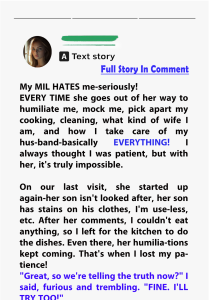From the moment I married Chandler, his mother, Linda, made it clear I wasn’t welcome. Every visit was a battlefield—my cooking mocked, my clothes criticized, my love for her son questioned. I tried to win her over with kindness, but her coldness never thawed. Chandler, ever the peacemaker, brushed it off. “She’s just protective,” he’d say. But I knew it was more.
One rainy afternoon, while cleaning out the attic of our old house, I stumbled upon a dusty box tucked behind insulation. Inside were letters—dozens of them, all written by Linda. They weren’t addressed to anyone. They were confessions, heartbreaks, memories. And they changed everything.
Linda had lost a child years before Chandler was born—a daughter named Grace. The grief had consumed her, but she never spoke of it. In those letters, she poured out her pain, her guilt, her fear that no one could ever love Chandler the way she loved Grace. She saw me as a threat to the fragile bond she had left.
One line broke me: “I see Macy trying, but my heart won’t let her in. I’m scared she’ll take Chandler away like Grace was taken from me.”
Suddenly, her cruelty wasn’t about me—it was about loss. About a wound so deep it distorted love into fear.
I cried for her. For the years we spent at war when we could’ve been healing together. I showed Chandler the letters. He was stunned. We both realized Linda wasn’t hateful—she was haunted.
The next time we visited, I didn’t defend myself. I simply said, “I found your letters.” Her eyes widened, then softened. For the first time, she didn’t look past me—she looked at me.
We talked. We cried. And slowly, the walls came down.
Linda never apologized outright, but she began to ask about my day, compliment my cooking, and even laugh at my jokes. It wasn’t perfect, but it was progress.
Sometimes, the people who hurt us are hurting too. And sometimes, the attic holds more than dust—it holds the truth we need to forgive.



